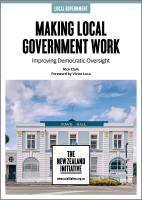Housing and Local Government
Housing affordability is one of the key factors that contribute to New Zealand’s cost-of-living crisis. The high cost of housing is also one driver of New Zealander’s high level of private indebtedness and an issue of intergenerational equality.
The Initiative’s research into housing affordability takes a different approach to the usual proposals of either just freeing up land and dropping regulations or compelling a reluctant population to live in high-density estates.
Instead, our research focuses on the context in which development takes place: local government. We examine the link between local government finance, and the incentives for local councils to develop land for housing.
There is a missing link between discussions of housing affordability (or rather a lack thereof) and finding workable financing management that allows local government to fund required infrastructure upgrades. We propose to close this gap with our research project examining international best practice.
Political decision-making in New Zealand is among the world’s most centralised. This is not necessarily a problem, but poor incentives combined with little local power can lead to weak local government performance. Local government has jurisdiction over a relatively small range of activities. At the same time, it is subject to expensive central regulatory mandates.
Our research investigates the role of local government in both New Zealand and abroad. What helps local government work well? How can appropriate incentive structures align council interests with those of the country? Can local governments encourage growth rather than constantly be at loggerheads with central government over the pace of consenting?









